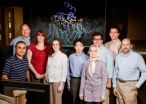Bilingualism no big deal for brain, Kansas researcher finds
2011-06-01
(Press-News.org) How do people who speak more than one language keep from mixing them up? How do they find the right word in the right language when being fluent in just one language means knowing about 30,000 words?
That's what science has wondered about for decades, offering complicated theories on how the brain processes more than one language and sometimes theorizing that bilingualism degrades cognitive performance.
But University of Kansas psycholinguist Mike Vitevitch thinks that complicated explanations of how the brain processes two or more languages overlook a straightforward and simple explanation.
"The inherent characteristics of the words — how they sound — provide enough information to distinguish which language a word belongs to," he said. "You don't need to do anything else."
And in an analysis of English and Spanish, published in the April 7 online edition of Bilingualism: Language and Cognition, Vitevitch found few words that sounded similar in the two languages.
Most theories of how bilingual speakers find a word in memory assume that each word is "labeled" with information about which language it belongs to, Vitevitch said.
But he disagrees. "Given how different the words in one language sound to the words in the other language, it seems like a lot of extra and unnecessary mental work to add a label to each word to identify it as being from one language or the other. "
Here's an analogy. Imagine you have a bunch of apples and oranges in your fridge. The apples represent one language you know, the oranges represent another language you know and the fridge is that part of memory known as the lexicon, which contains your knowledge about language. To find an apple you just look for the round red thing in the fridge and to find an orange you just look for the round orange thing in the fridge. Once in a while you might grab an unripe, greenish orange mistaking it for a granny smith apple. Such instances of language "mixing" do happen on occasion, but they are pretty rare and are easily corrected, said Vitevitch.
"This process of looking for a specific piece of fruit is pretty efficient as it is —labeling each apple as an apple and each orange as an orange with a magic marker seems redundant and unnecessary."
Given how words in one language tend to sound different from words in another language, parents who speak different languages should not worry that their children will be confused or somehow harmed by learning two languages, said Vitevitch.
"Most people in most countries in the world speak more than one language," said Vitevitch. "If the U.S. wants to successfully compete in a global economy we need people who can communicate with potential investors and consumers in more than one language."
INFORMATION:
Vitevitch is an associate professor of psychology at KU and an associate scientist with KU's Life Span Institute.
END
ELSE PRESS RELEASES FROM THIS DATE:
2011-06-01
Alexandria, VA –Next week marks the 67th anniversary of D-Day, when the Allies stormed the beaches at Normandy, France, and changed the face of World War II. Not much evidence of the war remains in Normandy: a few dilapidated relics, a cemetery, a war memorial. But something else was left behind that cannot be seen by the naked eye: shrapnel and iron and glass beads left over from the D-Day invasions in 1944.
Two geologists visited Omaha Beach in 1988 and collected samples of the sand. Upon returning to their labs, they examined the sand under microscopes and discovered ...
2011-06-01
In the 30 years since the first reported cases of a mysterious illness now known as AIDS, researchers have made extraordinary advances in understanding, treating and preventing the disease. Now the challenge, according to experts at the National Institute of Allergy and Infectious Diseases (NIAID), part of the National Institutes of Health, is to build on those successes to control and, ultimately, end the HIV/AIDS pandemic.
In an article published online today by the Annals of Internal Medicine, Anthony S. Fauci, M.D., NIAID Director, and Carl W. Dieffenbach, Ph.D., ...
2011-06-01
Each time you see a person that you know, your brain rapidly and seemingly effortlessly recognizes that person by his or her face.
Until now, scientists believed that only a couple of brain areas mediate facial recognition. However, Carnegie Mellon University's Marlene Behrmann, David Plaut and Adrian Nestor have discovered that an entire network of cortical areas work together to identify faces. Published in the current issue of the Proceedings of the National Academy of Sciences (PNAS), their findings will change the future of neural visual perception research and ...
2011-06-01
The following highlights summarize research papers that have been recently published in Geochemistry, Geophysics, Geosystems (G-Cubed), Geophysical Research Letters (GRL), the Journal of Geophysical Research-Atmospheres (JGR-D), the Journal of Geophysical Research-Biogeosciences (JGR-G), the Journal of Geophysical Research-Space Physics (JGR-A), Paleoceanography (PA), and Water Resources Research (WRR).
1. Analyzing subsurface oil and gas intrusions from Gulf spill
After the Deepwater Horizon blowout in 2010, hydrocarbons were released into the Gulf of Mexico. These ...
2011-06-01
CAMDEN – If you think that you're using humanely produced eggs for your omelets or deviled eggs, think again. Egg companies recognize that most Americans care about the welfare of farmed animals and many market their eggs with labels claiming the hens were treated well. But a Rutgers–Camden law professor warns that many of the animal welfare claims on egg cartons aren't all that they're cracked up to be.
Sheila Rodriguez, a clinical associate professor at the Rutgers School of Law–Camden, asserts that food consumers have a right to know how farm animals are raised and, ...
2011-06-01
CHAMPAIGN, lll. — Blood clotting is a complicated business, particularly for those trying to understand how the body responds to injury. In a new study, researchers report that they are the first to describe in atomic detail a chemical interaction that is vital to blood clotting. This interaction – between a clotting factor and a cell membrane – has baffled scientists for decades.
The study appears online in the Journal of Biological Chemistry.
"For decades, people have known that blood-clotting proteins have to bind to a cell membrane in order for the clotting reaction ...
2011-06-01
A team of Scripps Research Institute scientists has found a key biological mechanism underpinning the transition to alcohol dependence. This finding opens the door to the development of drugs to manage excessive alcohol consumption.
"Our focus in this study, like much of our lab's research, was to examine the role of the brain's stress system in compulsive alcohol drinking driven by the aversive aspects of alcohol withdrawal," said Scripps Research Associate Professor Marisa Roberto, Ph.D., senior author of the study.
"A major goal for this study," added Research Associate ...
2011-06-01
In the treeless, flat Prairie, you'd think a city would provide a good home for bats who like to snuggle up and roost in trees and buildings. But researchers at the University of Calgary made the surprising discovery that the urban landscape is far from ideal for these animals.
"I was really surprised," says Dr. Joanna Coleman, a sessional lecturer and recent PhD graduate in biological sciences at the University of Calgary and lead author of the study. "I fully expected bats to benefit from the expected increase in availability of roosts and food – insects -- in the city. ...
2011-06-01
PHILADELPHIA — Engineering structures on the smallest possible scales — using molecules and individual atoms as building blocks — is both physically and conceptually challenging. An interdisciplinary team of researchers at the University of Pennsylvania has now developed a method of computationally selecting the best of these blocks, drawing inspiration from the similar behavior of proteins in making biological structures.
The team was led by postdoctoral fellow Gevorg Grigoryan and professor William DeGrado of the Department of Biochemistry and Biophysics in Penn's Perelman ...
2011-06-01
The #1 ranked WordPress Training company announces they are providing private 1-ON-1 WordPress Training to individuals wanting t tailor their wordpress training needs to their own pace and also focus the training on THEIR OWN WEBSITES.
That's right, if you're looking for wordpress training from WP professionals now you can have the training or help you require tailored to YOUR needs or have the wordpress training professional assist you in teaching you how to customize or set-up YOUR specific website.
Aperio has found through it's over 1,500 students whom have taken ...
LAST 30 PRESS RELEASES:
[Press-News.org] Bilingualism no big deal for brain, Kansas researcher finds



